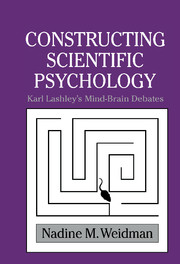Book contents
- Frontmatter
- Contents
- Preface
- Acknowledgments
- List of abbreviations
- Introduction
- 1 Lashley and Jennings: The origins of a hereditarian
- 2 Lashley, Watson, and the meaning of behaviorism
- 3 The pursuit of a neutral science
- 4 Neuropsychology and hereditarianism
- 5 Psychobiology and Progressivism
- 6 Psychobiology and its discontents: The Lashley-Herrick debate
- 7 Hull and psychology as a social science
- 8 Intelligence testing and thinking machines: The Lashley-Hull debate
- 9 Pure psychology
- 10 Public science and private life
- 11 Genetics, race biology, and depoliticization
- Epilogue: Lashley and American neuropsychology
- Appendix: Archives holding Lashley material
- Bibliography
- Index
2 - Lashley, Watson, and the meaning of behaviorism
Published online by Cambridge University Press: 16 September 2009
- Frontmatter
- Contents
- Preface
- Acknowledgments
- List of abbreviations
- Introduction
- 1 Lashley and Jennings: The origins of a hereditarian
- 2 Lashley, Watson, and the meaning of behaviorism
- 3 The pursuit of a neutral science
- 4 Neuropsychology and hereditarianism
- 5 Psychobiology and Progressivism
- 6 Psychobiology and its discontents: The Lashley-Herrick debate
- 7 Hull and psychology as a social science
- 8 Intelligence testing and thinking machines: The Lashley-Hull debate
- 9 Pure psychology
- 10 Public science and private life
- 11 Genetics, race biology, and depoliticization
- Epilogue: Lashley and American neuropsychology
- Appendix: Archives holding Lashley material
- Bibliography
- Index
Summary
Lashley and Watson
While he was working under Jennings's direction, Lashley began a fruitful collaboration with John B. Watson. Twelve years Lashley's senior, Watson had been trained in comparative psychology at the University of Chicago by Henry Herbert Donaldson and James Rowland Angell. He had initially been attracted by the iconoclasm of the physiologist Jacques Loeb, but Donaldson and Angell dissuaded him from doing his Ph.D. work with Loeb. Instead, Watson wrote his dissertation on the correlation between brain growth and learning ability in rats. For several years afterwards he taught psychology at Chicago.
In 1908, Watson became professor of psychology at Johns Hopkins, and the following year, when his immediate superior James Mark Baldwin resigned, Watson was promoted to the senior professorship in psychology. By then he was already beginning to formulate a materialist position in psychology, which reached full expression in his 1913 behaviorist manifesto, “Psychology as the Behaviorist Views It,” published in the Psychological Review. “Psychology, as the behaviorist views it,” Watson wrote, “is a purely objective, experimental branch of natural science. …” Unlike his teachers Donaldson and Angell, Watson believed that psychology could become a real science only by focusing on the study of behavior and ceasing its attempts to determine the content of the human mind.
- Type
- Chapter
- Information
- Constructing Scientific PsychologyKarl Lashley's Mind-Brain Debates, pp. 32 - 47Publisher: Cambridge University PressPrint publication year: 1999

